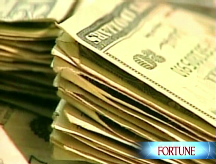Big banks get crushed
Citigroup and other big-name banks are continuing to plunge. And it may not be over.
NEW YORK (CNNMoney.com) -- Bank stocks plunged again Thursday with some of the biggest names in the industry falling to their lowest levels in more than a decade. It's anybody guess when the selloff will end.
"It's impossible to tell," said Jonathan Monk, a senior portfolio manager at the London-based Aerion Fund Management, which owns shares of a number of U.S. banks. "In the short term, who knows what is going to happen."
Among the hardest hit was Citigroup (C, Fortune 500), whose shares finished 26% lower Thursday afternoon, even though Prince Alwaleed Bin Talal, the firm's biggest individual shareholder, upped his stake in the New York City-based bank.
Just a day earlier, Citigroup lost nearly a quarter of its value amid fears that many of the same nagging problems that have plagued the company for more than a year now, such as losses tied to mortgage-related securities, still persist.
But the selling has not been isolated to only beleaguered institutions. Banks that have earned praise during the crisis for avoiding risky mortgages have fallen as well
For months, JPMorgan Chase (JPM, Fortune 500) has touted a "fortress balance sheet" only to see its stock continue to wither. On Thursday, its stock tumbled nearly 18% towards $23 per share - a level it hasn't hit since the spring of 2003.
Bank of America (BAC, Fortune 500) also took it on the chin, falling 14% Thursday to $11.25. The last time shares of the bank were this low was in 1996.
Even shares of the once invulnerable investment bank Goldman Sachs (GS, Fortune 500) have plunged in recent days. The stock fell nearly 6% to $52 Thursday, below the level that shares first priced at when the company went public back in May of 1999. Analysts are even predicting that the company will report a loss for the third-quarter in November.
Portfolio managers and analysts blamed market nervousness for the rout -- and said you can hardly blame investors given how much there is to worry about.
Lately, there have been doubts about how the U.S. government is handling the ongoing crisis and questions about what steps will be taken next.
There are also festering problems in the credit markets. Libor, a key banking lending rate, has fallen but still remains at elevated levels. Conditions have also improved in the commercial paper market, but only incrementally.
Investors are also wondering about the how the formerly standalone investment banks like Morgan Stanley (MS, Fortune 500) and Goldman Sachs will do business in the future, particularly as they potentially face greater government regulation. Both banks have become bank holding companies in the wake of the credit crisis.
"[Goldman Sachs] really dropped the ball on understanding that the highly leveraged business was going away," said one hedge fund manager that tracks banks and brokerages, who asked not to be named. "They are trying to figure it out themselves right now."
And then there's the dour view on the U.S. economy. If the unemployment rate keeps rising and consumer spending continues to slow, banks could find themselves facing even higher loan losses.
Even though most big banks are trading significantly below their 52-week highs, few analysts think that they are cheap enough to be attractive just yet.
As a group, diversified financial services firms such as Citigroup, Bank of America and JPMorgan Chase, are trading at 11.7 times price-to-earnings estimates for 2009, according to Thomson Baseline.
Bill Andrews, a portfolio manager for the Pittsburgh-based money manager C.S. McKee, which oversees $7 billion in assets, notes that these banks should be trading at a lower price-to-earnings multiple.
In fact, many of these banks are now more expensive than they were earlier this year since analysts have slashed their profit forecasts in the past few months.
"If anything [valuations] actually should be declining relative to where [they have] been," said Andrews, whose firm is currently underweight large-cap banks. ![]()


